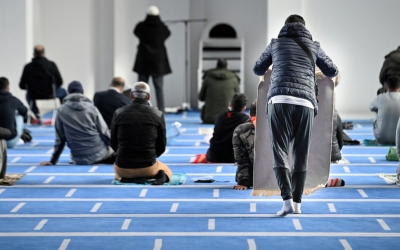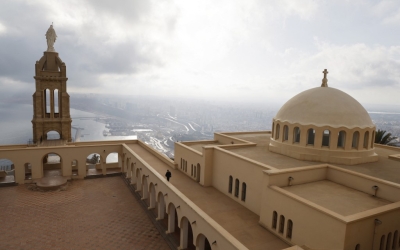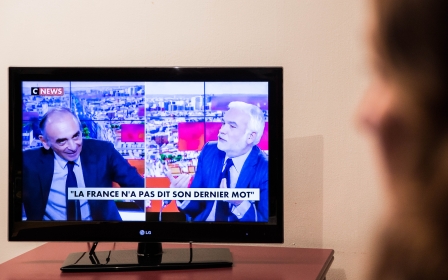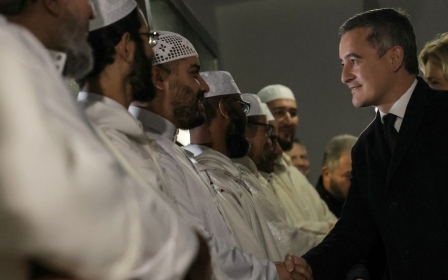'Unlivable': French-Algerians dream of a new life in Algeria to escape Islamophobia
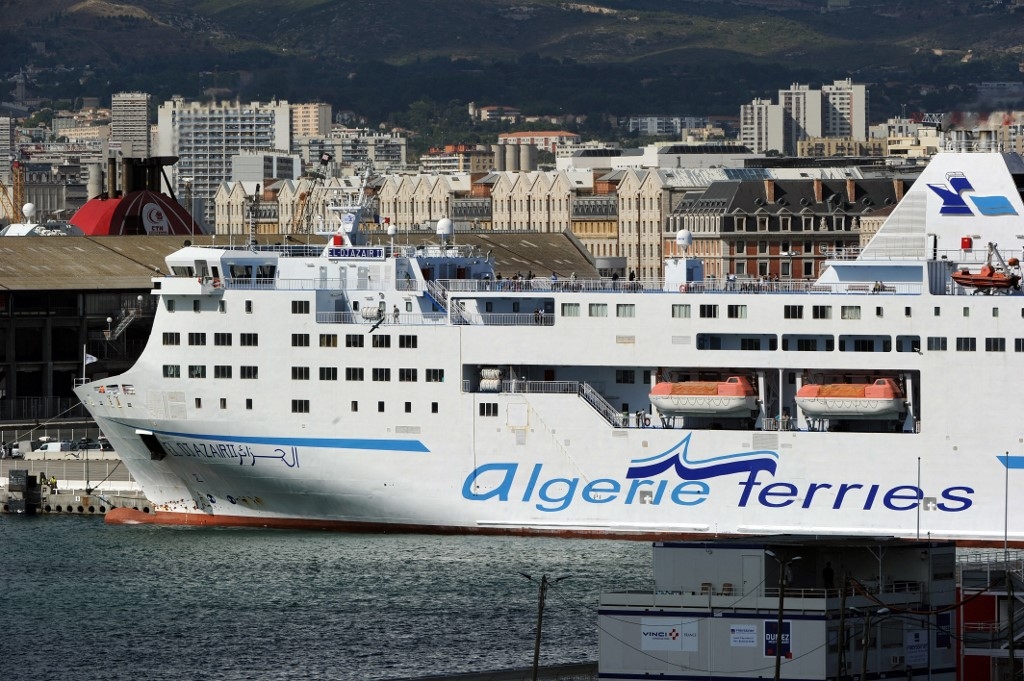
Souad is preparing to move to Algiers in a few months. The 45-year-old French-Algerian woman, a legal assistant living in Lyon, has chosen her parents’ country to start a new life with her 12-year-old son.
“The bad atmosphere in France is pushing me towards the exit a little,” she told Middle East Eye.
“Like all children of immigrants, I have always experienced racism and discrimination, but it was not on the same scale as today. It’s becoming relentless,” she added.
Souad said she no longer wanted to live “in a society that rejects” her.
“I’ve reached a point where I don’t find it normal anymore. I’m fed up.”
New MEE newsletter: Jerusalem Dispatch
Sign up to get the latest insights and analysis on Israel-Palestine, alongside Turkey Unpacked and other MEE newsletters
On social media, other Algerians born or raised in France, mostly young but sometimes elderly, both women and men, married or single, with children or not, are showing the same desire to cross the Mediterranean for a one-way trip.
They exchange ideas in Facebook groups such as “Make a successful hijra [migration, exile] to Algeria” or “Return to live in Algeria”, where, like Souad, they criticise the rise in racism and Islamophobia in France.
In February, the Interior Minister Gerald Darmanin indicated that anti-Muslim acts had increased by 30 percent in 2023 compared to the previous year.
Out of the 242 acts recorded, more than half were committed in the last three months of 2023, the minister specified, seeing a link with the start of the Israeli war on Gaza following the Hamas-led attacks on 7 October.
Notably, Darmanin acknowledged that anti-Muslim acts in the country were “clearly still underestimated.”
“I no longer feel at home in France. Despite my studies and my long career in teaching, I am constantly brought back to my origins,” Boussad, a mathematics teacher in a Paris high school, told MEE.
“Racism has become uninhibited. It is unleashed all day long on television screens.”
Retirement in Kabylia
In a couple of years, the 63-year-old man will retire and he plans to settle with his wife in his parents’ house in Maatkas, in Kabylia, the Tamazight-speaking region in the north of Algeria.
“This house was the only place where my father really felt at home, among his loved ones,” he told MEE.
“When I was young, we lived in a council estate in France and I didn’t understand my father’s stubbornness in wanting to build this house in Kabylia.
'I want my two daughters to grow up in a society that does not push them to the margins because of their name, their skin colour and their religion'
- Bachir, truck driver
“But as I grew older, I could measure the weight of the exclusion he faced as a modest construction painter and his intense desire to return to his country,” the teacher said.
For the first generations of immigrants, the prospect of returning to their native country was an essential element of the migration project.
As Algerian sociologist Abelmalek Sayad pointed out in his essay La Double Absence, Algerian immigrant workers experienced their presence in France as a “necessary exile” while at the same time hoping to return home someday.
“When we were little and my father took us to Algeria for the holidays in El Kseur, near Bejaia [in Kabilya, 220 km east of Algiers], he never stopped praising the beauty of the country,” Bachir, a 33-year-old French-Algerian truck driver from the northern city of Roubaix, told MEE.
His father secretly nurtured the dream of acquiring a pied-a-terre where the family could all live forever, Bachir said. But his project never became reality. As a warehouse worker, he barely earned enough to meet their needs.
Today, as if to take his revenge, Bachir has decided to take the plunge himself with his own family.
“I am taking exactly the same path as my father 40 years ago, but in the opposite direction,” he said jokingly, before pointing to a climate of hatred against foreigners and Muslims that makes France “unlivable”.
“I want my two daughters to grow up in a society that does not push them to the margins because of their name, their skin colour and their religion,” he said.
“My wish is that we can, as a family, practice our faith freely, without being accused of being separatists and Salafists,” he added, in reference to a 2021 law pushed forward by President Emmanuel Macron to fight “Islamist separatism” and accused of being discriminatory against Muslims.
To prepare their departure for Algeria, the young father made inquiries about practical aspects of life in the country with his acquaintances on both sides of the Mediterranean. For example, he aspires to open a transport company but does not yet know the necessary steps to create a business.
Bachir also does not know whether he will go and live in El Kseur, his parents’ hometown, or whether he should choose a bigger city offering better employment opportunities.
'The right decision'
For Souad, the prospects are a little clearer. In October 2023, she went on an exploratory trip to Algiers with one of her brothers - who also plans to go and live in Algeria.
For her, the housing problem is already solved because she will initially live in the house that her parents built near the Algerian capital, in Bouzareah.
Later, Souad aims to acquire a home in the western seaside city of Oran. “If all goes well, we will live there in the long term. I heard many good things about Oran,” she said.
On the professional front, Souad will firstly continue to work from home, then she plans to look for a job or undergo retraining.
'When we arrive in Algeria, there will definitely be a lot of difficulties. But in the end, we will gain the serenity and peace that we no longer have in France'
- Souad, legal assistant
“I had the idea of creating a call centre. But it didn't work. Too much administrative hassle,” she said, without losing heart.
“I know how Algeria works, that bureaucracy there is a real obstacle to initiative,” she added.
“During my last trip, a bank clerk refused to open an account for me because he considered that my passport was not a valid ID, while one of his colleagues could open one without any problem the next day with his own passport.”
The legal assistant is also worried about her son’s schooling. Since the Algerian government banned private schools from teaching the French curriculum last October, Souad wonders how he will be able to integrate into an Algerian school where classes are taught in Arabic.
“Neither he nor I speak Arabic fluently,” she admitted.
But she deems the obstacles worthwhile.
“When we arrive in Algeria, there will definitely be a lot of difficulties. The codes are not the same. But in the end, we will gain the serenity and peace that we no longer have in France,” she said.
Lamia, an English teacher, shares this opinion. She left her hometown of Douai, in the north of France, 12 years ago when she married an Algerian man from the western city of Mostaganem, where she lives today.
And she does not regret her choice.
“I realise, every time I return to France, that I made the right decision. Instead of integrating immigrants and their children into the national community, the state ostracises them with shameful laws and political practices,” she said.
“I would never have found my place in France if I had stayed there, especially with my veil,” she told MEE by phone.
Officially, there are no statistics about the number of French-Algerians who have chosen Algeria as their country of residence.
These “returns” can also seem marginal compared to the scale of the phenomenon of Algerian migration towards Europe.
Algerian President Abdelmadjid Tebboune regularly expresses his wish to include the diaspora, which he qualifies as “an integral part of the national societal fabric”, in the development of the country.
A number of measures have been taken by the authorities to allow Algerians abroad to benefit from some promotional housing and micro-entrepreneurship employment schemes, with loans largely funded by the state.
However, in terms of rights, dual nationals are not quite on the same level of equality as their fellow citizens in Algeria. For instance, a new law adopted in October prevents them from owning a media outlet. They also cannot hold high political office.
This article was translated from MEE French edition (original).
Middle East Eye delivers independent and unrivalled coverage and analysis of the Middle East, North Africa and beyond. To learn more about republishing this content and the associated fees, please fill out this form. More about MEE can be found here.


